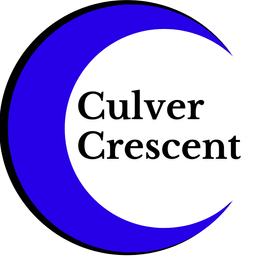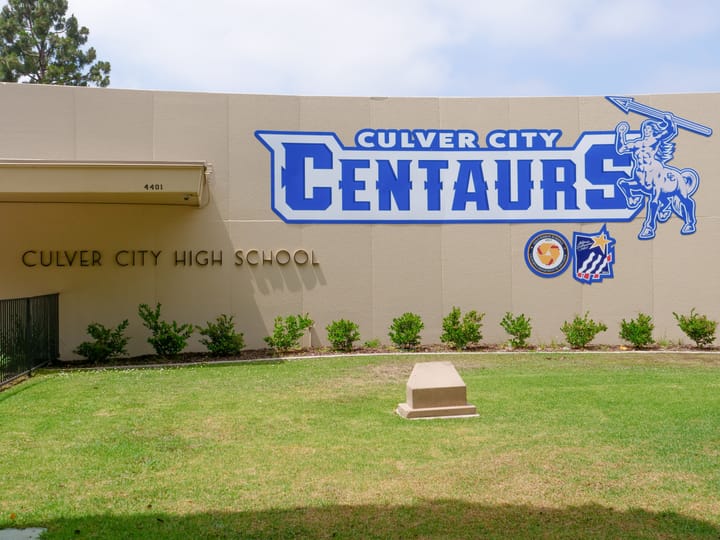Honors English to return to Culver City High School
AP Seminar will remain an elective course when Honors English returns for 10th Graders at Culver City High School in the 2026-27 school year

Honors English will soon make its return to the Culver City Unified School District.
The CCUSD Board of Education voted to bring an Honors English course back to Culver City High School for 10th graders beginning in the 2026-27 school year during its regularly scheduled meeting Tuesday night. This course will be offered alongside the current College Prep 10 class as one of the two options for 10th Grade English at CCHS.
An AP Seminar class was introduced this school year as a potential substitute for Honors English, but it will remain an elective after Tuesday night's decision.

Loud Voices
Bringing back Honors English has been a hot topic in the District since the move to remove the class, having since attracted significant national attention. Board Member Lindsay Carlson said that it was an issue she heard about more than almost anything else during her 2024 campaign and something residents continue to express concerns about.
"This is a subject other than the budget that I have been kind of forced to spend the most amount of time on," Carlson said Tuesday.
The Board's decision was influenced by the results of outreach done to both parents and students on the current English course, and some of the relevant results of a survey open to the Culver City community were shared in a presentation made to the Board on Tuesday night.
"This is the first time in my memory that there has been a survey for academic issues open to both parents and students," Joanna Schaenman said during her public comment at the meeting.
Many community members felt that bringing the District back should bring Honors English back as an option. According to the survey, 62.3% of Culver City students from Grades 6-12 would be interested in taking Honors English if it were available, and an even larger majority of parents support bringing the option back.
The reasons for people's desire for the return of Honors English are varied. Some feel that the extra GPA given to UC-accredited Honors courses was important for students' college prospects, while others felt College Prep was too easy and did not adequately prepare them to take AP classes in the 11th grade.
While parents and students have been outspoken about the lack of challenge present in the course, survey results show students who find the current English course too easy are not as common as they may appear based on public commentary. While a quarter of surveyed students said that their English classes were too easy, 67.5% of respondents said that the difficulty of the class they were taking was just right.
Data Versus Evidence
CCHS teachers arguing for College Prep have pointed out that these classes use the same curriculum as the old Honors English classes and result in a better learning environment for all, but Board Member Lindsay Carlson pushed back against that notion with statistics she had gathered on English performance at Culver City High Schools.
One of the measurable metrics of success for these College Prep classes was improved enrollment in 11th and 12th-grade AP English classes for at-risk populations like the Black/African American and Hispanic/Latino(a) communities, which demonstrates a students' confidence in their ability to handle the subject after taking College Prep 10.
Carlson said that things didn't quite turn out that way.
"What we found back in April when I walked [former Assistant Superintendent of Educational Services Dr. Angela] Baxter through the data is that the hypothesis was completely incorrect," Carlson said.
Improving achievement across the board for students was another goal of the College Prep class, which Carlson reasoned could be seen through a decrease in failing grades and an improvement in statewide test scores.
While the number of D's and F's given to students has decreased, a decline in outside scores led her to believe the former success was more closely associated with changes to grading policy than the improved achievement these classes were meant to encourage.
In a PowerPoint presentation she prepared for the meeting, Carlson showed scores from California Assessment of Student Performance and Progress (CAASPP) assessments reflect a decrease in most Language Arts test performance metrics over the past three years.


"No standardized test is entirely objective; there are various social aspects that come into play there," Carlson said. "However, this is a test uniformly applied across the state to measure student performance against a specific standard."
Board Member Andrew Lachman believes that adding additional English pathways could help solve another issue the district is facing: classroom sizes. Lachman told Culver Crescent that he believes several key factors were missing from the College Prep class effort in Culver City, adequate class sizes being one of them.
"We need a plan to show how we are going to make our 10th-grade classes smaller," Lachman said Tuesday. "In the 10th grade, we are still up to 30 [students].
His evidence for the need for a return to Honors English can be seen in the other school districts that have made similar moves to de-track curriculum. He argued that there has only been one true success story for this approach in the New Rochelle City School District in New York, where a concerted effort and investment have been made to ensure the removal of Honors English achieved the results its advocates have hoped for.
On top of having a smaller average class size, Lachman said that New Rochelle also made significant investments in tutoring services for its at-risk students, seen through a partnership with Tutor.com that provides free assistance 24/7.
"We can't do either," Lachman said of the keys to New Rochelle's success. "We don't have the money to make class sizes smaller unless we offer a dual enrollment or some other alternative option."
The New York-based school district also took several years to prepare for the removal of Honors English, while CCHS "ripped the band aid off," according to Lachman. This careful approach has resulted in a 70% English and Language Arts (ELA) proficiency rate among New Rochelle High School's Black and African American students and a 74% rate for Hispanic and Latino/a students, according to 2023-24 assessment data.
While this data closely aligns with test scores in the District from 2022-23, the numbers in Culver City have declined since then. While the current cohort of students was impacted by COVID-19's interference with education, the ELA proficiency rates of 52.5% and 61% for Black and Hispanic students were a sign to Lachman and Carlson that Culver City's approach was not working.
"Every Student Has High Potential"
While the need and desire for accelerated learning are clear, concerns over leaving others behind and not creating an equitable learning environment were still a concern on the dais.
Teachers have spoken at past meetings about how the label of honors can discourage those who do not see themselves as high-level learners. Psychological and social factors can make it difficult for many demographics to join Honors English, even with open enrollment.
"There were barriers for students going in," Board Member Brian Guerrero said of open enrollment Honors classes. "We have not dealt with that at all, but we are putting back that old system."
Some parents who spoke at the meeting were also concerned with moving away from a plan recommended by those who teach the class and work with students on a daily basis.
Additionally, the survey results themselves were called into question, particularly after public commenter Melissa Sanders openly talked of tampering with the results of a survey during her comment Tuesday night, alarming at least one speaker.
"We don't have demographic or school site data, and we don't know whether the families most affected even saw the survey," public commenter Samin said Tuesday, "and now we are hearing of people screwing with the surveys when we are relying on survey results."
The same separation of students that played a part in the decision to establish College Prep will appear again, Guerrero argued, and he feels the way students will be distributed is predictable.
"I am not just talking about racial and ethnic [segregation]," Guerrero said. "We are going to see a concentration of English learners...of low-income students...of students with disabilities in what becomes the 'lower class.'"
Guerrero accepted that his ideal scenario would not be realized on Tuesday, but pushed back against the philosophy of identifying kids with "high potential" among the student body.
"Every single student has high potential," Guerrero said. "Every single student has the potential to excel in these classes."
What The Future Holds
Once it became apparent that the Board would vote to bring back Honors English for 10th grade, the discussion turned to what English learning at CCHS would look like moving forward.
Board of Education Vice President Stephanie Loredo focused her questions on what the implementation of Honors English would look like in 2026 and beyond. Since the current College Prep English uses the curriculum of the old Honors English course, a new, distinct curriculum will be developed and presented to the Board for approval at a future meeting.
UC accreditation was among Loredo's top priorities, as it gives a student's adjusted GPA a boost in UC school applications.
"Whatever we need to do to get there," Loredo said of the accreditation, "I am going to be okay with it."
With Honors now back in the picture, the usefulness of AP Seminar as an English class was also put into question. As Loredo pointed out, AP Seminar was only implemented due to a need to provide additional options quickly and the availability of both an established curriculum and teachers qualified to instruct the class.
"Are we providing enough opportunities for them to provide writing samples for when they do their college applications?" Loredo wondered about students using AP Seminar as their English course.
Despite being in support of bringing back Honors English, Board President Triston Ezidore felt the conversation surrounding literacy at Culver City schools was not being focused on in the right places. He argued that interventions and strategies to ensure students can read and write effectively need to be implemented far before they reach Culver City High School.
"If we're having the conversation in 10th grade English that kids can't read," Ezidore said, "it's too late."
The vote to reestablish Honors English alongside College Prep English in 10th grade, while keeping AP Seminar as an elective, passed 4-1, with Guerrero dissenting.





Comments ()